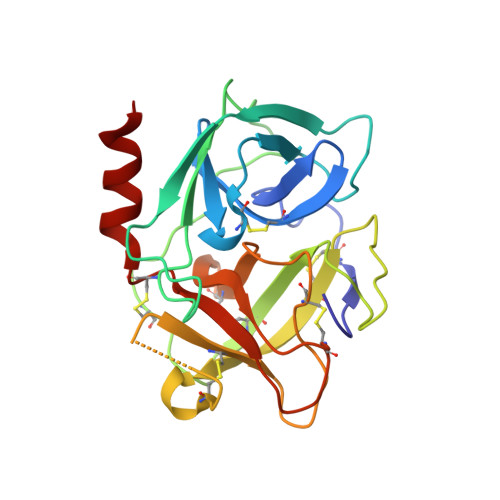Small-molecule factor D inhibitors targeting the alternative complement pathway.
Maibaum, J., Liao, S.M., Vulpetti, A., Ostermann, N., Randl, S., Rudisser, S., Lorthiois, E., Erbel, P., Kinzel, B., Kolb, F.A., Barbieri, S., Wagner, J., Durand, C., Fettis, K., Dussauge, S., Hughes, N., Delgado, O., Hommel, U., Gould, T., Mac Sweeney, A., Gerhartz, B., Cumin, F., Flohr, S., Schubart, A., Jaffee, B., Harrison, R., Risitano, A.M., Eder, J., Anderson, K.(2016) Nat Chem Biol 12: 1105-1110
- PubMed: 27775713
- DOI: https://doi.org/10.1038/nchembio.2208
- Primary Citation of Related Structures:
5FAH, 5FBE, 5FBI, 5FCK, 5FCR - PubMed Abstract:
Complement is a key component of the innate immune system, recognizing pathogens and promoting their elimination. Complement component 3 (C3) is the central component of the system. Activation of C3 can be initiated by three distinct routes-the classical, the lectin and the alternative pathways-with the alternative pathway also acting as an amplification loop for the other two pathways. The protease factor D (FD) is essential for this amplification process, which, when dysregulated, predisposes individuals to diverse disorders including age-related macular degeneration and paroxysmal nocturnal hemoglobinuria (PNH). Here we describe the identification of potent and selective small-molecule inhibitors of FD. These inhibitors efficiently block alternative pathway (AP) activation and prevent both C3 deposition onto, and lysis of, PNH erythrocytes. Their oral administration inhibited lipopolysaccharide-induced AP activation in FD-humanized mice. These data demonstrate the feasibility of inhibiting the AP with small-molecule antagonists and support the development of FD inhibitors for the treatment of complement-mediated diseases.
Organizational Affiliation:
Novartis Institutes for BioMedical Research, Novartis Pharma AG, Novartis Campus, Basel, Switzerland.
















